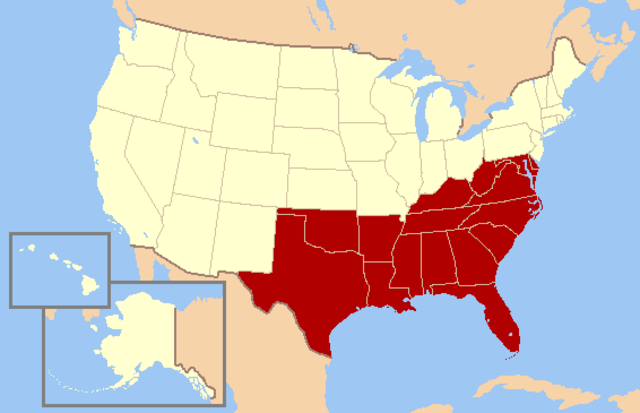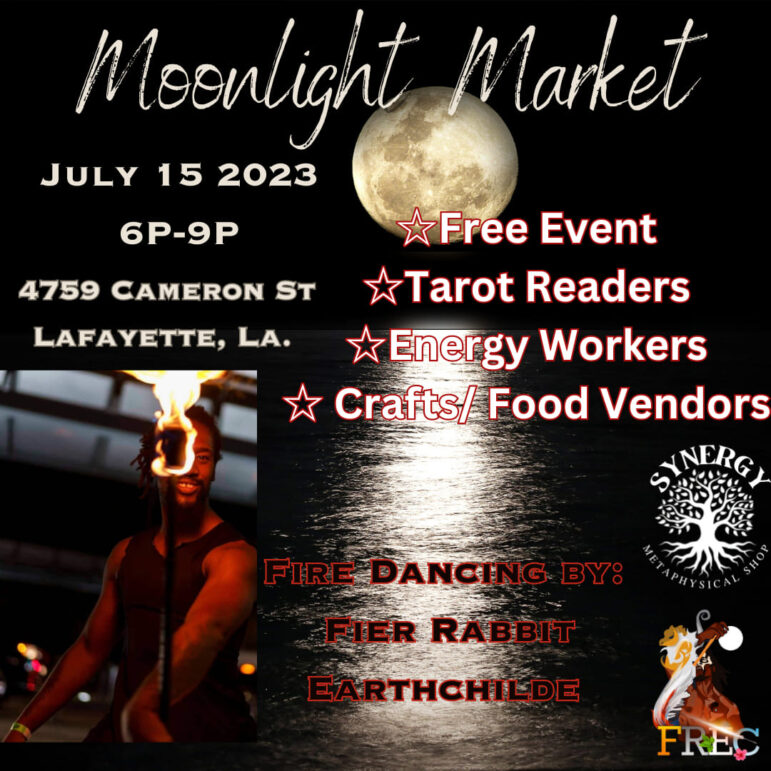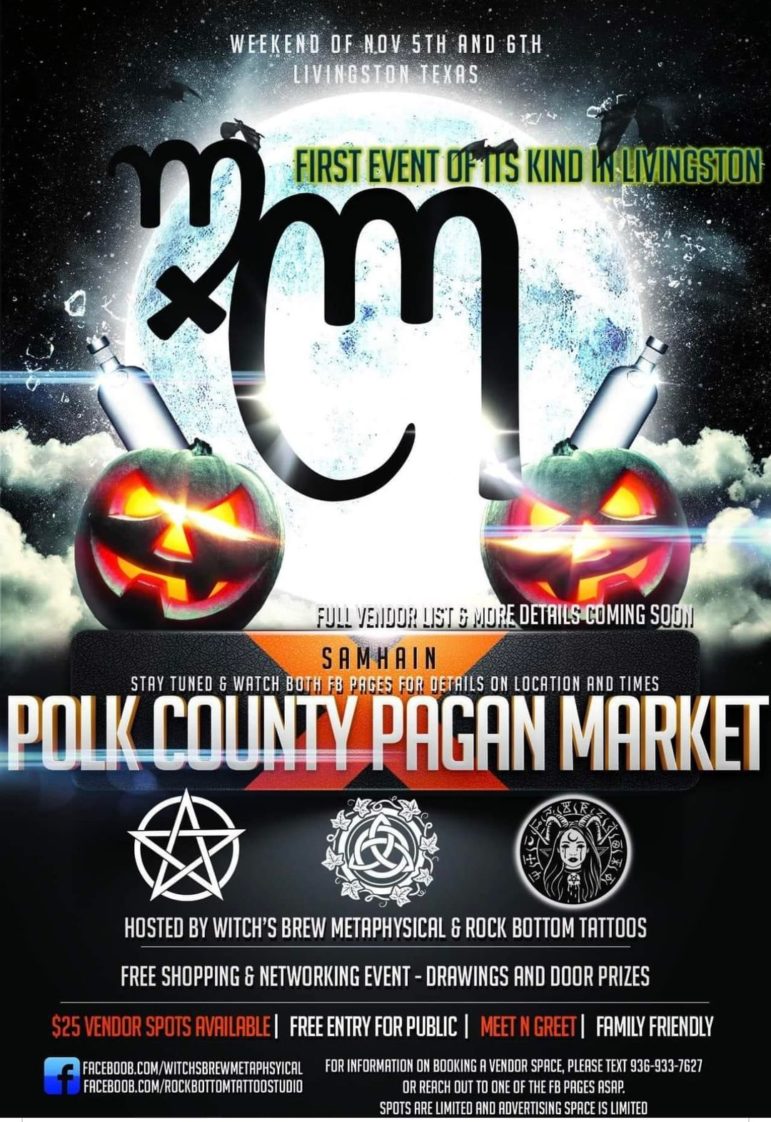Today’s guest correspondent is Sue Lincoln, a veteran journalist and broadcaster, now recovering (retired) from covering Louisiana’s second favorite sport — politics. Sue is a Mother Earth-worshipping feminist Witch, longtime Rennie, and co-owns a Pagan-themed crafting business, Uncustomerry, with one of her daughters.
BATON ROUGE, Louisiana – While it may seem that states like Louisiana, Alabama, and Texas are firmly under the buckle of the Bible Belt, locally organized Pagan-themed markets are popping up all across the Deep South. And they’re proving profitable enough to repeat regularly.
These aren’t the big witchy bazaars, traveling from one major metro area to another, and charging hefty admission fees as they fill convention centers with tables and booths exhibiting mostly imported wares, although those events are making appearances on occasion. Instead, these mystically-themed marketplaces in small cities and towns are showcasing handmade goods crafted by local and regional makers.

The southern United States, as defined by the United States Census Bureau. [Credit: Gator 87 CC BY-SA 3.0]
Take, for example, the Alexandria-Pineville metro area in the center of Louisiana, drawing from a population of just over 150 thousand people. Marilynn Casida (pronounced “Cassiday”) is one of the original organizers of the area’s Magickal Market.
“We started the market in October 2020,” she explains. “We were a group of local social media friends who were restless after the Covid quarantines, and we each had a bunch of stuff we’d made while we’d been stuck in the house. We had seen posts about Pagan markets in other areas and decided this would be a fun way to share our crafts in the traditionally spooky month. It worked, and we even made the local TV news.”
Marilynn has since left Magical Market to start another local event company called Magick ‘n Moonlight’s Mystique Bazaar, which hosts pagan markets on the second Saturday of every month at Fighting Hand Brewing Company in Pineville, LA. The bazaar also hosts pagan art experiences and is currently working on a spiritual retreat.
The small version of the market now meets monthly, on a Saturday evening, inside and around the outside of Fighting Hand Craft Brewery in Pineville. The big market has been held quarterly, closing down and taking over several streets in downtown Alexandria all day on a Saturday. I’ve been out at several of the events and saw no signs of protest or objections. But then, they’ve been going for nearly three years.
“Of course, there were some nasty comments posted to the TV station’s website after the original story aired, but no one came out in person – then or after – to protest,” Casida says. “On the other hand, a lot of other Witches and Pagans came out of the broom closet, responding to the comments on the TV station website, so we knew that in the future the market was going to fly.”

The success of Alexandria’s market inspired Tara Guy to start Moonlight Market this year in Lafayette, Louisiana, which now operates on a Saturday evening, every other month. We spoke at her July 15th event.
“I’d been vending at similar markets in Louisiana and Texas, and realized there was a need in my area, a hole I could help fill by making my shop’s parking lot available to crafters every couple of months,” says Guy. “We’ve been doing it since March, and even tonight with the temperature at 95 degrees, we’ve got 30 vendors.”
Guy, who owns and operates Synergy Metaphysical Shop in Lafayette, says the market is now a regular factor in her business decisions.
“It’s been such a success that when scouting a new place for my shop, I specifically looked for a location that would allow me to expand the market. I’ll admit, it’s been a big boost for my shop sales, too. Every event brings me up to four times the amount of money I otherwise average on a Saturday.”
Guy says she took a cue from the quarterly market in Alexandria, which offers the lagniappe (a little something extra) of performances by local musicians.
“I’ve also found that having specific types of entertainment – and promoting that – helps the turnout. The first time we had belly dancers. The second time, we had a singer, and turnout was way down. (We were competing with graduations that weekend, though.) This time, we’ve got a fire dancer, and turnout is way up again, even with this heat.”
Tyler, Texas, is a city of approximately 100.000, located along I-20 about halfway between Dallas and the Louisiana border. As with Alexandria, Witches in Tyler made their first foray into hosting a market in the fall of 2020. New Moon Market is now held monthly in Tyler’s downtown square.
I was at New Moon in April, and every available stall space in and around the square (which is the size of a city block) was occupied by vendors. Most of the patrons were from northeast Texas, although more than a few said they had driven over from Shreveport, Louisiana – nearly 100 miles away.

On that particular day, a small group of men, each wearing t-shirts emblazoned with “prayer warrior,” gathered in a circle on a corner at the back of the square. They were obviously taking turns praying about the Pagan gathering, but they weren’t loud about it, nor were they at all confrontational with either vendors or patrons. And once the market ended, as vendors were packing up, several of the men came and offered assistance.
That’s vastly different from the men consistently showing up to make obstreperous objections to the Polk County Pagan Market in Livingston, Texas.
Despite that uncongeniality, the market is flourishing.
Jason McLelland is the Polk County Pagan Market’s founder and organizer. (Last year, some of his struggles with muggles in trying to get the market started were profiled here in The Wild Hunt.) The first market was held on a Saturday in early November 2022, and the most recent, held the last weekend in July to celebrate Lughnasadh, had expanded to the full weekend.
McLelland, who also has an online metaphysical shop, says he started the market after hearing from a number of local makers who were having trouble trying to market their crafts.
“They weren’t welcomed or successful at Trade Days,” he says, referring to the bi-monthly spring and fall regional swap meet events at the same city park location where the Pagan markets now open. “Similarly, Pagan crafters’ wares weren’t wanted in local indoor flea markets or considered acceptable for local church bazaars. Yet their products do sell, and sell well.”
The most recent market had 98 vendors, despite the National Weather Service’s issuance of severe heat warnings. Actual temperatures reached 101 and above, and the heat indices – the “feels like temperatures that factor in the humidity – were over 115 both days.
“We’re forming a true community,” McLelland said with satisfaction, as he looked around at the stalls under the pavilions and the pop-up tents under the trees. He does acknowledge that some of the unity manifesting in the community comes from participants resolving to stand together against the negativity spouted by the Pagan Market’s habitual protesters.
“Some patrons come out just to get into verbal fights with these protesters,” McLelland admits, although he says the protesters have been known to do more than simply shout invective. “At our last event in May, they were blocking the road in, turning cars away, telling them the event had been canceled. We called police, who just drove up and watched. Of course, while the officers were here, the protesters simply stepped back from the road and preached.”
On Saturday afternoon of the most recent Pagan Market, I went over to the park’s front gate to speak with two men making no secret of their antipathy toward the event and its patrons. They’d brought their Bibles and a battery-operated bullhorn, along with two signs advising that all who entered should “FEAR GOD” as well as “Burn in Hell.” Neither of the men would shake my hand as I introduced myself to them, with one saying, “We don’t want to take a chance of assault accusations.” Fair enough. One refused to give me his name – or even speak to me at all – while the other said his name was “Josh”, and that he was a “pastor at a Holiness Pentecostal Church nearby.”
I asked what brought them out in the heat, and Pastor Josh told me it was simply that “We have to take a stand against sin.”
“We aren’t protesting,” he said, “We’re preaching. Our goal is to glorify God.”
The other man aimed the bell of his bullhorn toward the nearer pop-up tents shading market stalls, and began chanting, “Burn in hell! Burn in hell! Burn in hell!”
Unperturbed by either the volume or the contradiction posed by his companion’s invective, Pastor Josh continued, “We preach for God’s glory at college campuses and concert venues, as well.”
That sounded so much like another venomous group I’d encountered on college campuses in Louisiana that I asked, “Are you affiliated with Consuming Fire Fellowship?”
“Oh, you know Britt Williams? I trained with him!” Josh said, excitedly. And he smiled at me for the first time as I acknowledged that I’d spoken with Williams and his group’s members on several occasions. His fellow objector’s invective escalated in both volume and animosity at this point, so after thanking Josh for his time and encouraging him to stay cool in the heat, I returned to the market area proper. There I shared my conversation and information with Veterans for Equality, a volunteer group providing security for the market, as they do for other events.
The organization’s Chief Tactical Security Officer, Benjamin Clodfelter, told me they had assembled a dossier on “Pastor Josh”, whose full name is Joshua Herridge. He’s the assistant pastor of Pentecostal Lighthouse Church in Livingston (his dad, Mark Herridge, is the senior pastor). The congregation tops out at about 50 people, if you count the children, too. Pastor Josh also runs a lawn care service.
Herridge has established a bit of a record of fanaticism.
In 2019, he filed a federal civil suit against Montgomery County, Texas, asserting his constitutional right to free speech had been violated when law enforcement officials ordered him to take his preaching across the street. He’d been blocking the entrance to the Woodlands’ Pavilion, a major concert venue in the Houston area. ZZ Top was performing that night, and Herridge, declaring “There’s so much sin that goes on there,” was insistent that his right to preach trumped the fact that the location was private – not public – property. Herridge argued with officers for nearly half an hour before being categorically ordered to leave the premises or face arrest.
In 2021, the federal District Court ruled against Herridge, stating that Woodlands’ Pavilion policy had been drawn for public safety, rather than to restrict the content of Herridge’s speech and that preaching does create traffic congestion. Further, the ruling remarks that “the First Amendment does not guarantee the right to communicate one’s views at all times and places, or in any manner desired.”
On appeal in 2022, the U’S Fifth Circuit Court of Appeals upheld the District Court’s decision.
Herridge has also become familiar to students and staff on the campus of Sam Houston State University in Huntsville, Texas, where he emulates his mentors from Consuming Fire Fellowship, calling down doom on any who walk past him without stopping to listen. Consuming Fire’s adherents have become well known for their hate-filled rhetoric, as they frequently preach outside the Student Union buildings on the campuses of the University of Louisiana-Lafayette, Southeastern Louisiana University, LSU, Mississippi State, and Ole Miss. Located in rural Gloster, Mississippi (population 897,) Consuming Fire is – like Josh Herridge’s church – part of the Holiness Pentecostal denomination, with a congregation of approximately 60 members, including children.
Their “open-air evangelism” follows a hellfire-and-brimstone pattern of hatred very similar to that of the better-known Westboro Baptist Church, calling down damnation on “fornicators, liars, hypocrites, adulterers, Mormons, Buddhists, druggies, idolaters, thieves, murderers, blasphemers, Catholics, Hindus, feminists, sodomites, drunkards, revelers, atheists, Muslims, socialists, transgenders, and humanists.”
And while one Pagan market has attracted the attention of their Texas-based brethren, Consuming Fire, at least, has yet to put Witches, Heathens, or Pagans on their “official” damnation signage.
And maybe it’s the branding being used by most of the markets that are letting them fly under the extreme evangelicals’ radar. Using words like “Mystical,” “Magickal,” or “Moonlight” in their event naming is less in-your-face than the choice the Livingston, Texas, group made as the “Polk County Pagan Market.”
When asked if he regretted the name choice, in view of the recurring rancor from the preachifiers, McLelland said no.
“It’s truth in advertising. And as long as we let them intimidate us into hiding our beliefs and who we are, they win and we lose. For years they’ve gotten to put a fish symbol or a cross or ‘Christian-owned’ on their businesses. Now we are profiting with our own market.”
The Wild Hunt is not responsible for links to external content.
To join a conversation on this post:
Visit our The Wild Hunt subreddit! Point your favorite browser to https://www.reddit.com/r/The_Wild_Hunt_News/, then click “JOIN”. Make sure to click the bell, too, to be notified of new articles posted to our subreddit.